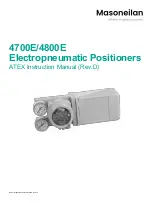
6. If the actuator is equipped with an
MCV-3 Manual Control Valve), place
the left MCV-3 handle in the manual
position. If the actuator is not
equipped with an MCV-3, use the
block valve (1/4 “ ball valve) installed
between the positioner output and
the actuator. Once the actuator has
reached its desired position (based
on the mid-signal applied to the in-
strument port – Step 5), place the
block valve in the closed position.
7. Final Sensitivity Drum Adjustment
For positioner’s bleeding to atmos-
phere:
Disconnect any bug vent or tube fitting
from the exhaust port.
Turn the deadband adjustment drum in
the direction of decreasing numbers,
until the exhaust port begins to bleed
gas. Than turn the drum in the oppo-
site direction until the exhaust port just
stops bleeding.
The unit is properly adjusted if increas-
ing or decreasing the input signa by .2
psig causes the cylinder top and bot-
tom gauges to develop differential
equal to at least 20% of power gas.
Replace the exhaust fitting
For Positioner’s bleeding to a pres-
sure system:
Slowly decrease the setting of the
deadband (decreasing numbers) until
both cylinder gauges are equal and
read 90 to 95% of power gas pressure.
Deadband Setting
1. Turn the deadband adjustment drum
in the direction of
increasing the
numbers until the drum can no
longer turn. Then turn the adjust-
ment drum
one full turn in the oppo-
site direction (use the numbers on
the drum as a guide).
2. If not already attached, wind 3-4
coils of the range spring
onto the re-
tainer.
3. If not already adjusted, set the bias
adjustment screw in the middle of
its travel range.
4. Apply power gas to the HPP-5 posi-
tioner
5. Set the instrument signal pressure
at the midpoint of its range (e.g.. 9
psig for a 3-15 psig range, 18 psig
for a 6-30 psig range). Allow the ac-
tuator to stroke the valve to an inter-
mediate position and the gauge
pressures to balance. (if the valve
does not stroke, insure that the po-
sitioner is communicating with the
actuator cylinder. If equipped with
an MCV-3, make sure the MCV-3
left handle is in automatic.
Signal Line from Control-
HPP-5
8
September 1999
HPP-5 Positioner
Adjustment Procedures


























